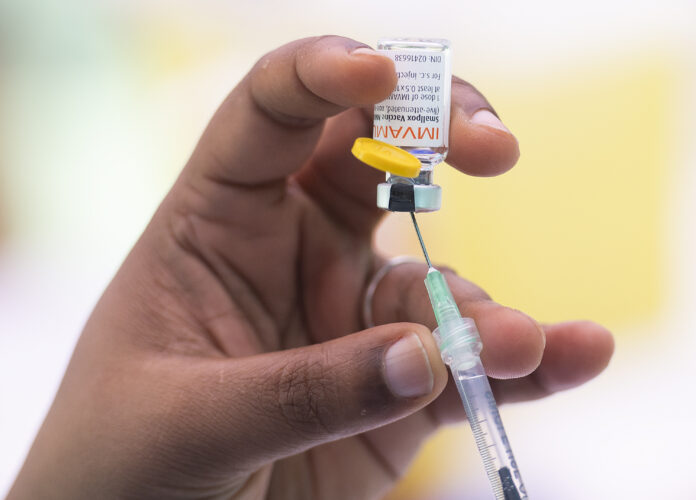A “sustained downward trend” of monkeypox infections in Canada is “encouraging to see,” the head of the World Health Organization (WHO) said Wednesday.
Tedros Adhanom Ghebreyesus, director-general of the WHO, told reporters during a news conference in Geneva, Switzerland, that despite several countries in the Americas seeing an increase in infections, Canada appears to be an outlier.
“In the Americas, which accounts for more than half of reported cases, several countries continue to see increasing numbers of infections, although it is encouraging to see a sustained downward trend in Canada,” he said.
“Some European countries, including Germany and the Netherlands, are also seeing a clear slowing of the monkeypox outbreak, demonstrating the effectiveness of public health interventions and community engagement to track infections and prevent transmission.”
In Canada, new monkeypox infections have slowed since the onset of the outbreak in May. In its last report published Aug. 26, the Public Health Agency of Canada reported 1,228 monkeypox cases to date. Up until that date, Canada saw 338 new monkeypox cases from the first reporting period for the month on Aug. 3. Between July 29 and July 4, there were 503 new cases reported.
Earlier this month, Canada’s Chief Public Health Officer Dr. Theresa Tam said there were early signs the country’s monkeypox infections were starting to slow. However, it was “too soon to tell” if cases had plateaued.
“The cases are not increasing at the speed at which they were increasing at the beginning of the outbreak and so we will just keep monitoring that trend in the next number of weeks,” Tam said Aug. 12.
‘Too soon to tell’ if monkeypox plateauing in Canada, but some early signs of slow down – Aug 12, 2022
In Europe, there have been signs of a sustained week-on-week decline in the onset of cases in nations like France, Germany, Portugal and Spain. One of those countries is Britain, where on Aug. 15, authorities said about 29 new monkeypox infections were reported every day, compared to about 52 cases a day during the last week in June.
Trending Stories
Russia facing ‘numerous failures’ with Iran-supplied drones for Ukraine war: U.S.
Canada set for ‘unprecedented’ home price drop by early 2023: TD Bank
In the United States, the Centers for Disease Control and Prevention reported 182 new cases on Aug. 24, a decline from 656 on Aug. 23 and 676 on Aug. 22. America has the most number of monkeypox infections reported during this outbreak, with 18,417 logged to date.
Globally, more than 47,600 confirmed cases in 90 countries where monkeypox is not endemic have been reported since early May. The WHO has declared the outbreak a global health emergency.
However, last week, the number of monkeypox cases reported globally dropped by 21 per cent from the week prior, reversing a month-long trend of rising infections.
Monkeypox has been endemic in parts of Africa for decades and experts suspect the outbreaks in Europe and North America were triggered after the disease started spreading through sexual contact at two raves in Spain and Belgium.
It typically requires skin-to-skin or skin-to-mouth contact with an infected patient’s lesions to spread. People can also become infected through contact with the clothing or bedsheets of someone who has monkeypox lesions.
Monkeypox outbreak can be eliminated in Europe: WHO officials
The majority of the cases have been reported in men who have sex with men, but officials have said it can spread to any population. Officials around the world have been working with vulnerable populations, and have been offering vaccination to them.
With the right measures in place, the monkeypox outbreak can be stopped, Tedros said.
“But it won’t just happen. Eliminating monkeypox needs three things: the evidence that it’s possible, which we are now beginning to see, political will and commitment, and the implementation of the public health measures in the communities that need them most,” he said.
“We might be living with COVID-19 for the foreseeable future. But we don’t have to live with monkeypox. WHO will continue to support all countries to stop this outbreak and eliminate this virus.”
— with files from The Associated Press and Reuters
© 2022 Global News, a division of Corus Entertainment Inc.



